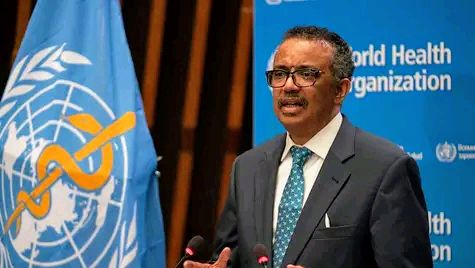World Health Organization has revealed that the Republic of Congo is experiencing severe outbreak of mpox with over 4500 suspected cases and 300 deaths have been reported so far this year, triple the number of cases and deaths reported in the first quarter of last year.
WHO Director-General who made the disclosure when giving his opening remark at the media briefing on Wednesday said nineteen of DRC’s 26 provinces reported cases, and 70% of cases and 87% of deaths are in children under 15 years of age.
He said, “While mpox is spread among children by close contact, there is also a concerning outbreak among adults due to sexual transmission in previously unaffected areas.
“These outbreaks are being caused by clade one of the virus that causes mpox, which has been present in DRC for decades, and can cause higher mortality than the clade two virus that spread globally in 2022”, he added.
Ghebreyesus stated that WHO and its partners, including Africa CDC, supporting Ministry of Health to respond to the outbreak and to assess mpox vaccines. “However, additional funding is needed to expand and sustain the response and ensure the virus does not spread to neighbouring countries.
“WHO has called consistently for more attention to better understand, stop mpox transmission in Africa, and improve clinical care and access to vaccines. At its meeting last month, WHO’s Strategic Advisory Group of Experts on Immunization, SAGE.
“Also issued a call to action to enhance access to mpox vaccines; to improve regulatory and procurement processes; to ensure research is embedded in emergency vaccine deployment; and to invest in research capacity in Africa.
“The mpox outbreak is one of several overlapping crises in the DRC.There are also outbreaks of measles and cholera, severe flooding in more than half of provinces, and since the beginning of this year, more than 350,000 people have been displaced, mostly because of armed conflict”, he said.
Speaking on the killing of seven humanitarian workers from World Central Kitchen in Gaza on Monday, Ghebreyesus said WHO is horrified, to think of the work they were doing was saving lives, providing food to thousands of starving people.
According to him, “Their cars were clearly marked and shouldn’t have been attacked. Delivering humanitarian aid in Gaza is already difficult and dangerous. Hungry people will go unfed because World Central Kitchen has quite understandably paused its operations.
“I honour our colleagues for their service, and for putting themselves in harm’s way to serve others. WHO has been working with World Central Kitchen in Gaza to deliver food to health workers and patients in hospitals.
He pointed out that the horrific incident highlights the extreme danger under which WHO colleagues and its partners are working and will continue to work. “But we only do so with safe access. This means effective and transparent mechanism for deconfliction must be put in place to ensure humanitarian convoys can move safely.
“We need more entry points, including in northern Gaza, cleared roads, and predictable and expedited passage through checkpoints. Delays and denials of humanitarian missions not only prevent us from reaching those in need, but also impact other operations and deliveries by diverting scarce resources”.
In addition to the attack on the World Central Kitchen convoy, he said WHO is appalled that Al-Shifa hospital has been put out of action, and that much of it has been badly damaged or destroyed.
Ghebreyesus said, “Over the last few days, WHO’s team in Gaza has been seeking permission to access what is left of the hospital, to speak with staff and to see what can be saved. But at the moment, the situation looks disastrous.
“Al-Shifa was the largest hospital and main referral centre in the Gaza Strip, with 750 beds, 26 operating rooms, 32 intensive care rooms, a dialysis department and a central laboratory. I repeat: hospitals must be respected and protected; they must not be used as battlefields.
“Since the conflict began, WHO has verified 906 attacks on health care in Gaza, the West Bank, Israel and Lebanon, resulting in 736 deaths and 1014 injuries. Only 10 of Gaza’s 36 hospitals are still able to function even partially. WHO will continue to support those hospitals to deliver services as best they can.
“More than 33,000 people have now been killed in Gaza, and almost 80,000 injured. We are seeing a very high burden of respiratory and skin infections and diarrhoeal illness. This Sunday marks six months since the conflict began.
“WHO welcomes last week’s UN Security Council resolution demanding a ceasefire, and call for its immediate implementation. Once again, we call for all hostages to be released, and for lasting peace”, he said.












